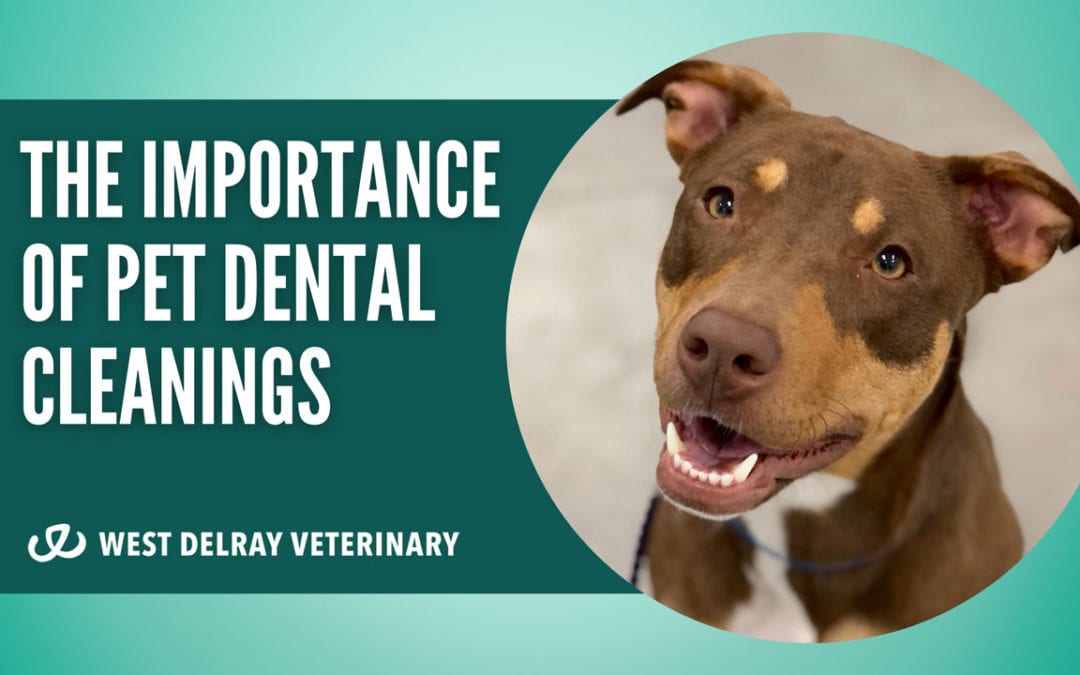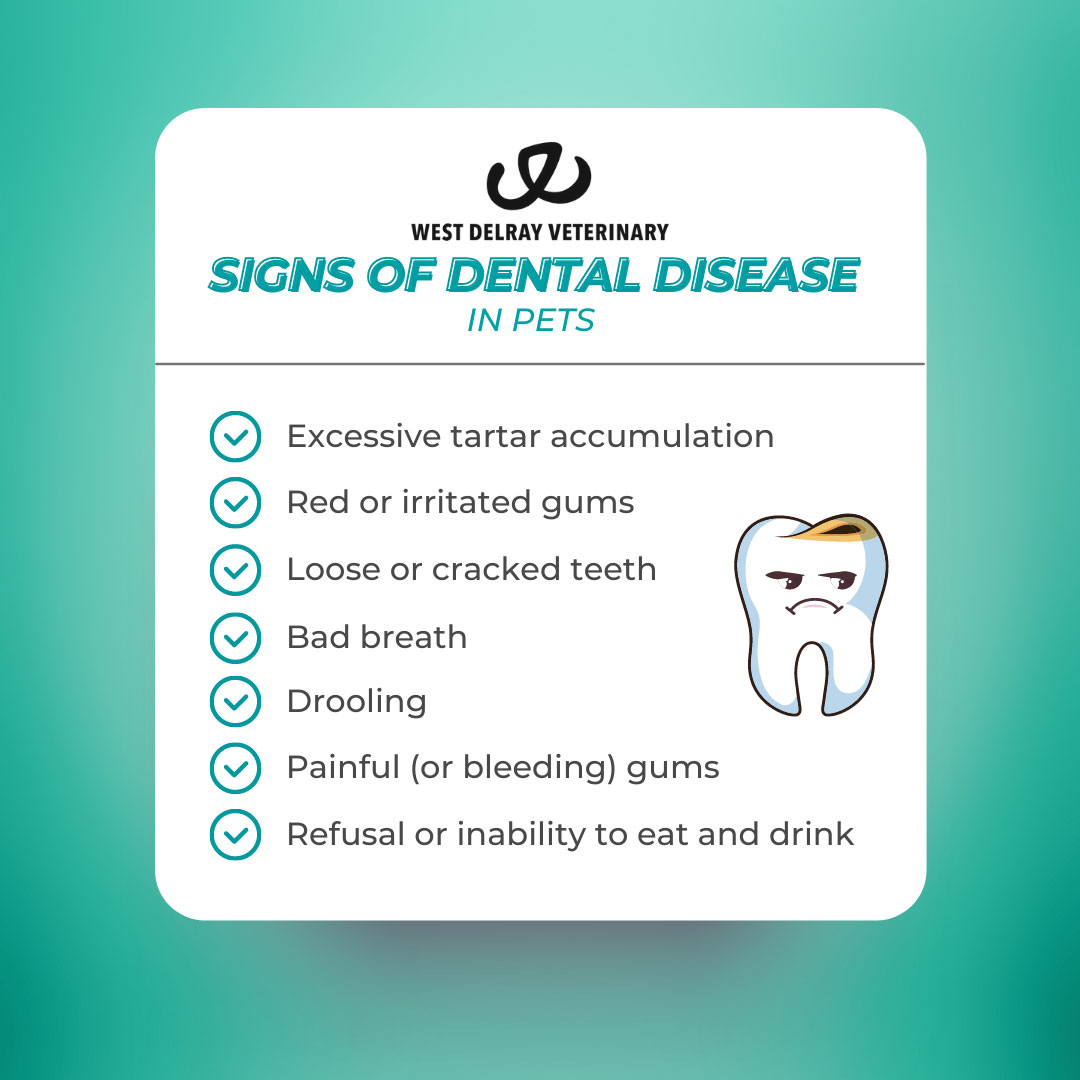Dental disease affects the teeth, gums and structures that support and surround a pet’s teeth. Tartar below the gumline causes inflammation and not only damages the structures supporting the teeth but also causes infection. When dental disease reaches this stage, pets can experience serious dental problems, pain, and potential secondary systemic health consequences.
How can you spot dental disease in your pet?
We recommend regular tooth brushing several times a week. When brushing, take a quick glance at all of your pet’s teeth and gums (or just take a peek once or twice a week if you don’t brush often). Signs of dental disease include, but are not limited to, excessive tartar accumulation, red or irritated gums, cracked teeth, loose teeth, bad breath, drooling, painful (or bleeding) gums, and refusal or inability to eat and drink.
So… why are teeth cleanings for pets so important?
Just as it is for people, preventative dental care is critical for your pet’s overall health. Getting your pet’s teeth cleaned is not only to keep them pearly white! A professional dental cleaning removes not only the visible plaque and tartar on the teeth surfaces but also the bacteria under the gums. This eliminates potential sources of infection to the mouth and other organs and helps prevent progressive dental disease. Regular preventative dental cleanings prevent:
- Excessive tartar accumulation and gum inflammation (gingivitis)
- Loose or diseased teeth/gums (periodontal disease)
- Oral pain
- Bad breath (halitosis)
- Secondary organ damage (heart, kidneys, liver)
- Worsening dental disease
How does dental disease lead to other health problems?
If the early stages of dental disease are ignored, bacteria in the plaque can enter the bloodstream and spread to the heart, kidneys and liver. This spread of bacteria, called bacteremia, can damage organs and make pets quite sick. Luckily, with good oral health and regular dental cleanings you can prevent bacteremia and subsequent organ damage.
What does a typical dental procedure include:
It is typical for veterinary dental procedures to take place under general anesthesia. This allows the veterinary dental professional to perform a thorough examination, dental cleaning/scaling/polishing, full mouth digital x-rays of the teeth and tooth roots, and any additional procedures that may be indicated. There is a growing movement of non-anesthetic dentals, but this approach to veterinary dentistry is not yet accepted as a safe or effective approach to pet dental care. In general, to provide thorough and comprehensive veterinary dental care, general anesthesia is necessary and required.
A typical dental procedure includes:
- Thorough oral exam of teeth, gums, and other structures of the mouth and face
- Digital dental x-rays
- Dental cleaning, scaling, polishing of the teeth and below the gumline
- Other necessary treatments (only if indicated): tooth saving treatments, extractions, gum resections, mass removals
At West Delray Veterinary we offer technologically advanced dental services and digital dental radiology for comprehensive dental diagnostic and treatment capabilities. Preventative dental cleanings are essential to your pet’s health and wellbeing. Caring for your pet’s teeth can prevent other health problems, saving you tons of money over the long term!
But, don’t listen to us! Listen to one of our happy patients!
“I have a 7 month old Maltese puppy named Marshmallow. He had a mouthful of deciduous teeth (baby teeth) that never fell out as they should have at his age. In fact, an adult tooth erupted in the same space as his baby tooth creating pain and discomfort in his bite.
I was extremely nervous because removing the baby tooth so close to the adult tooth is a complicated procedure. I almost wanted to avoid doing the dental surgery and questioned to myself if Marshmallow would be just fine living with some extra baby teeth.

I interviewed a couple of veterinarians and felt most comfortable with Dr. Melanie Thomas and her staff at West Delray Vet who were extremely patient with my million questions and took the time to listen and answer them all. I know their practice uses the Integrative approach combining holistic with the medical.
I made the decision to go ahead with Marshmallow’s dental surgery.
After doing his pre-surgery X-rays, they discovered multiple baby teeth (5) which needed to be removed. I gave them the okay and they proceeded. When I went to pick up Marshmallow they actually gave me the baby teeth in a clear glass tube. They were pulled intact and whole, just beautifully from the root.
My comment was, “This is museum quality”!
I was pleasantly surprised to see this after I had read that baby teeth are like eggshells and can break while being extracted possibly leaving the root behind causing problems.
This certainly was not the case, as the talented and skilled Dr. Melanie Thomas extracted them just perfectly.
It’s been two days now after Marshmallow’s surgery and he is the happiest I’ve seen him.
He had a quick recovery, thanks to the superb medical care the West Delray Vet team gave him. He actually is smiling his doggie smile. Never had he smiled prior to this and we are so delighted. Now he chews his food unlike prior to his extractions where he found it difficult to do so as the extra baby teeth didn’t allow his mouth to close and bite properly.
We are so grateful to Dr. Melanie Thomas and the staff at West Delray Vet. We now have a happy, healthy puppy who can finally be normal and enjoy life. “ – The Wallaces
Our pets rely on us to help them keep their teeth clean and working! Schedule an initial consultation for your pet with Dr. Jonathan Block or Dr. Melanie Thomas at West Delray Veterinary in Delray Beach, Florida today.
Book an appointment here.
Click here to read additional information on our dental services.


